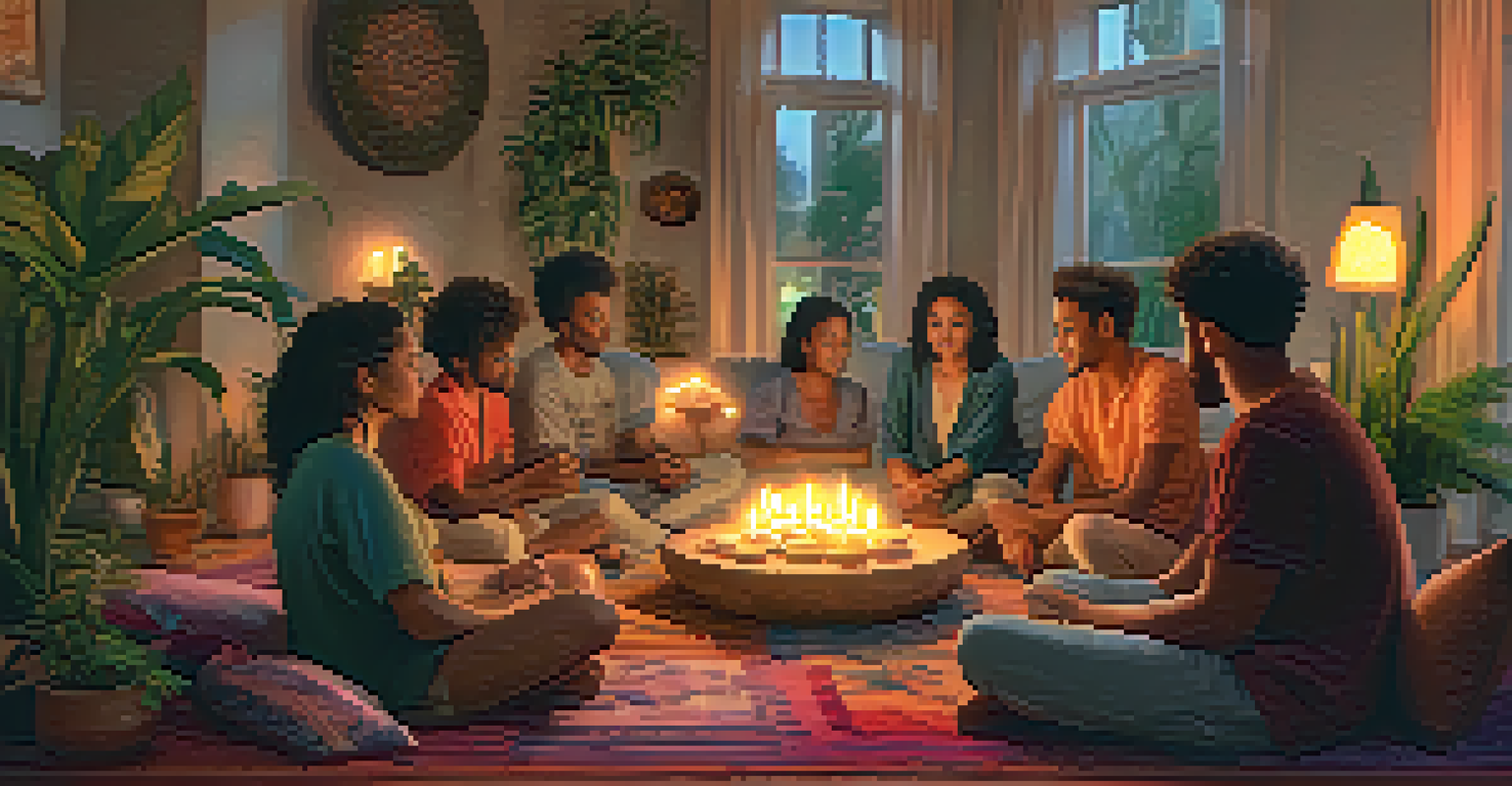The Psychological Effects of Hallucinogens on Social Groups

Understanding Hallucinogens and Their Effects
Hallucinogens are substances that alter perception, mood, and cognitive processes. Common examples include LSD, psilocybin mushrooms, and mescaline. These substances can lead to vivid visual and auditory experiences, often referred to as 'trips.' Understanding how these effects manifest is crucial for exploring their impact on social interactions.
The best way to find yourself is to lose yourself in the service of others.
When individuals consume hallucinogens, their brain chemistry changes, leading to altered states of consciousness. This can enhance emotional experiences and foster a sense of connection with others. However, the effects can vary widely from person to person, making it essential to consider individual differences in reactions.
In social settings, hallucinogens may encourage open communication and bonding among users. However, it's important to recognize that the experience can also lead to confusion or anxiety, particularly in unfamiliar or uncomfortable environments.
The Role of Shared Experiences in Group Dynamics
Shared experiences can significantly influence group dynamics, especially under the influence of hallucinogens. When individuals partake in these substances together, they often report a heightened sense of unity and collective experience. This can foster deeper connections and understanding among group members.

For instance, groups engaging in activities like music festivals or retreats often find that hallucinogens enhance their sense of community. Participants may feel more empathetic and attuned to each other's feelings, leading to stronger social bonds. This phenomenon can create lasting friendships and a supportive group environment.
Hallucinogens Alter Perception
Hallucinogens like LSD and psilocybin change brain chemistry, leading to vivid experiences that can enhance emotional connection.
However, it’s crucial to approach these shared experiences with caution. While they can deepen connections, they can also expose vulnerabilities, as individuals may confront personal fears or emotional issues during their trips.
Hallucinogens and Empathy: A Double-Edged Sword
One of the most intriguing psychological effects of hallucinogens is their potential to enhance empathy. Many users report feeling a profound connection to others, which can lead to greater understanding and compassion. This effect can be particularly beneficial in therapeutic settings or group therapy.
We are all connected; to each other, biologically. To the earth, chemically. To the rest of the universe, atomically.
However, this heightened empathy can also have its drawbacks. If not managed carefully, emotional overload may occur, leading to discomfort or distress within the group. Participants might become overwhelmed by their feelings or the emotions of others, which can complicate social interactions.
To navigate these complexities, it’s essential for groups to create a safe and supportive environment. Setting intentions and fostering open communication can help mitigate potential negative experiences and enhance the positive aspects of empathy.
Social Identity and Hallucinogen Use
Social identity plays a significant role in how individuals experience hallucinogens within a group. People often seek out communities that share similar values and beliefs, and these shared identities can shape the effects of hallucinogen use. A strong sense of belonging can amplify positive experiences during a trip.
Conversely, individuals who feel isolated or disconnected from their group may struggle during their experience. Their lack of social support can lead to feelings of paranoia or anxiety, detracting from the overall experience. Understanding the importance of social identity can help groups foster a more inclusive atmosphere.
Shared Experiences Build Unity
Partaking in hallucinogens together can foster deeper connections and empathy among group members, enhancing social bonds.
Ultimately, cultivating a sense of belonging within a group can enhance the positive psychological effects of hallucinogens, leading to richer and more meaningful experiences.
The Influence of Environment on Group Experiences
The setting in which hallucinogens are consumed can significantly impact the group experience. A supportive and safe environment can enhance feelings of connection and joy, while a chaotic or uncomfortable setting may lead to anxiety or fear. This illustrates the importance of 'set and setting' in shaping the experience.
For example, a tranquil outdoor setting might promote feelings of peace and unity among group members, whereas a crowded party could lead to overstimulation and discomfort. Groups that prioritize creating a positive environment are more likely to have rewarding experiences.
By being mindful of their surroundings and choosing appropriate settings, groups can better navigate the complexities of hallucinogen use and maximize the psychological benefits.
Potential Risks of Group Hallucinogen Use
While the psychological effects of hallucinogens can be profound, there are also potential risks associated with group use. Miscommunication and differing expectations among group members can lead to tension and conflict during the experience. It’s essential for participants to discuss their intentions and comfort levels beforehand.
Additionally, the intensity of emotions experienced can vary greatly among individuals, which may create imbalances in the group dynamic. Some may find themselves overwhelmed, while others feel elated, leading to potential misunderstandings or feelings of isolation.
Environment Influences Experience
The setting in which hallucinogens are consumed significantly impacts the group's emotional dynamics, highlighting the importance of a safe environment.
To mitigate these risks, groups should prioritize open dialogue and establish clear guidelines for their shared experience, ensuring that everyone feels safe and supported.
The Therapeutic Potential of Hallucinogens in Groups
Recent research has highlighted the therapeutic potential of hallucinogens, particularly in group settings. Studies suggest that these substances can facilitate profound emotional healing and personal growth when used in a controlled, supportive environment. This has led to a resurgence of interest in psychedelic therapy.
In group therapy, hallucinogens can encourage vulnerability and honesty among participants, fostering a sense of community during the healing process. Sharing experiences can help individuals process emotions and provide valuable insights into their personal challenges.

While the therapeutic use of hallucinogens is still being explored, the early results indicate that they may hold significant promise for enhancing psychological well-being in social groups.